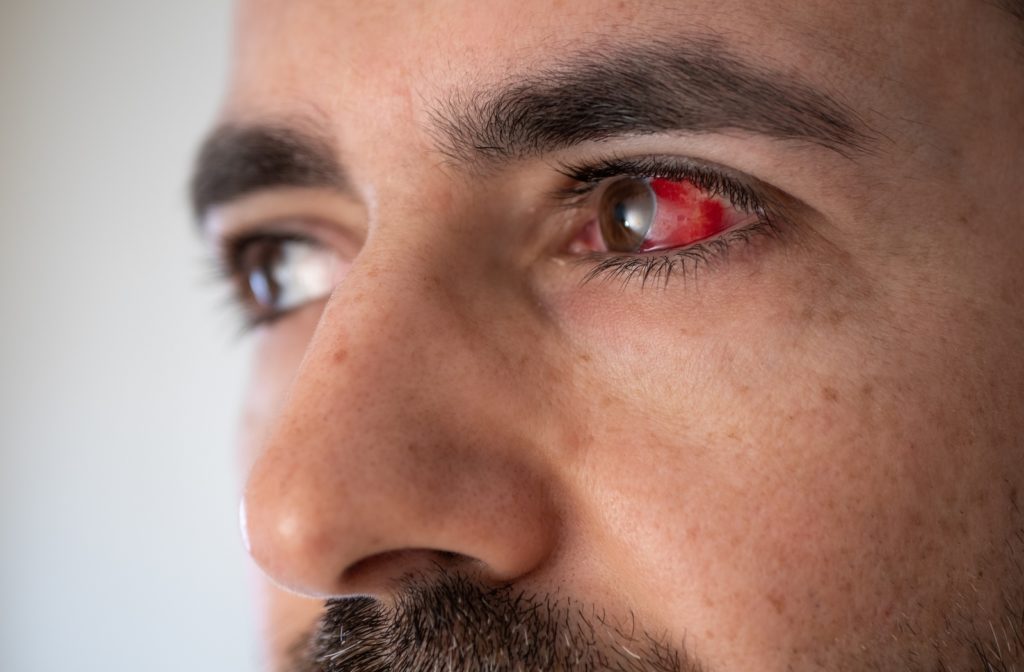What’s That Red Spot in Your Eye?
When a red spot suddenly appears on your eye, it can seem alarming, even when it doesn’t affect your vision. A subconjunctival hemorrhage (SCH) is a red spot caused by a broken blood vessel on the eye. A burst blood vessel on the eye can look scary but is typically harmless. However, before patients move on from the red spot, it’s crucial to diagnose why it happened.
Broken blood vessels on the eye can result from eye disease or injury. It may also be caused by increased blood pressure. Although the condition may not affect your sight, patients should still contact us for emergency eye care. It’s better to be cautious to protect your eye health.
What Is a Subconjunctival Hemorrhage (Broken Blood Vessel in the Eye)?
A subconjunctival hemorrhage is a small bleed under the clear surface of your eye (the conjunctiva), which causes a bright red or bloodshot area. It’s usually painless and harmless, resolving on its own within 1–2 weeks.
Symptoms of a Broken Blood Vessel in the Eye (Subconjunctival Hemorrhage)
A broken blood vessel in the eye (also called a subconjunctival hemorrhage) most often appears as a bright red or bloodshot patch on the white part of your eye. While the appearance can be dramatic, this condition is usually painless and does not affect your vision. Common symptoms can include:
- A red or bloodshot area on the white of the eye
- Mild eye irritation or scratchiness
- A feeling of fullness in the eye
- Occasionally, people may experience a headache, blurry vision, sensitivity to light, or mild discomfort.
If you notice pain, changes in vision, headache with nausea, or repeated episodes, it’s important to talk to your eye doctor as soon as possible, as these symptoms could indicate a more serious eye problem that needs immediate attention.
What Causes Burst Blood Vessels in the Eye?
There are 2 types of causes of burst blood vessels in the eye: traumatic and spontaneous. Traumatic refers to physical trauma, such as an eye injury. A spontaneous cause describes an unknown reason or the result of a health condition elsewhere in the body.
A small, single red spot appearing on your eye is not a concern in most cases. The broken blood vessel on your eye is similar to a minor bruise found on your skin. The brilliant red will eventually fade, sometimes appearing yellowish as the hemoglobin and blood components break down. Your eye may also feel irritated, scratchy, or swollen as it heals.
A broken blood vessel should not affect your vision. However, suppose you notice other symptoms, including eye pain, blurry vision, or a persistent headache. In that case, you may require emergency eye care. Additional symptoms, or multiple broken blood vessels, can indicate an eye problem. Contact your optometrist for an eye exam to evaluate your eyes and sight.
Traumatic Subconjunctival Hemorrhage
Trauma can be a bit of an alarming term, but it doesn’t necessarily mean something dramatic has happened. For example, trauma to the eye can include eye rubbing, a poorly-fitted contact lens, or corneal abrasion.
Eye Rubbing
Eye rubbing can sometimes be a reflex. Your eye is irritated, so you rub to relieve the sensation. Feeling the occasional irritation or dryness is normal. However, consistently feeling irritation, itchiness, dryness, or burning can be symptoms of an eye problem.
Allergies are a common reason for frequent eye rubbing. Infections and chronic eye conditions, such as conjunctivitis (pink eye), dry eye, or blepharitis, can also increase the urge to rub your eyes. Unfortunately, rubbing your eyes too hard or frequently can cause eye trauma.
Eye trauma caused by eye rubbing can increase the risk of infection and lead to vision impairment. For example, chronic eye rubbing is a risk factor for developing keratoconus. The condition causes the cornea to become thin and bow outwards, leading to blurry or distorted vision.
Contact an optometrist for an emergency appointment if you experience symptoms after eye rubbing, including:
- Eye pain
- Blurry vision
- Headache
- Light sensitivity
- Nausea or fatigue
- Redness or inflammation
- Reduced vision
When rubbing your eye results in a broken blood vessel, talk to your optometrist. We can help treat conditions causing eye discomfort and recommend some tips for breaking your rubbing habit.

Spontaneous Subconjunctival Hemorrhage
A spontaneously broken blood vessel has no known cause, but there are some common possibilities. The most significant is an increase in blood pressure. For example, you may experience a spike in blood pressure during a workout, after a strong sneeze, or have elevated blood pressure because of a health condition.
Diabetes is a chronic health condition that can cause high blood pressure. Additional diabetes health complications increase the risk of a broken blood vessel and other eye health concerns.
Diabetic Eye Disease
Diabetic eye disease is a group of eye conditions including:
Each eye condition has particular symptoms and can cause vision changes. Some general symptoms of diabetic eye disease include:
- Blurry vision
- Double vision
- Flashes of light
- Floaters
- Loss of visual field
Diabetes weakens blood vessels by decreasing their elasticity. Although there are no blood vessels in the cornea (front of the eye), there are blood vessels in supporting eye tissue, including the conjunctiva (transparent layer over the eye surface).
A subconjunctival hemorrhage (SCH) affects the conjunctiva, not the cornea, which is why visually is typically not affected. However, if the broken blood vessel results from weakening blood vessels, it’s crucial to seek treatment to prevent worsening symptoms.
When Should I Worry About a Broken Blood Vessel in My Eye?
A broken blood vessel on the eye usually resolves within 5–10 days. First, however, it’s crucial to diagnose the cause. A broken blood vessel can be a symptom of severe eye health conditions, which may require immediate treatment to save sight or prevent worsening health outcomes.
If you experience significant pain, changes in vision, or if the condition persists or worsens after a couple of weeks, it is advisable to seek medical attention. Additionally, if the subconjunctival hemorrhage is recurrent or accompanied by other symptoms, such as bruising elsewhere on the body or a history of bleeding disorders, consulting with a healthcare professional is recommended to rule out any underlying issues.
What to Do After a Blood Vessel Breaks in the Eye
If you notice a red or bloodshot spot in your eye, don’t panic. Most broken blood vessels in the eye are harmless and resolve on their own within two weeks. However, it’s still a good idea to pay attention to your symptoms and monitor any changes.
When in doubt, it’s always better to get your eyes checked by a professional. Our optometrists at Discover Eyecare in Chilliwack and Abbotsford are here to help diagnose the cause, answer your questions, and provide the right care to protect your vision.
Book an appointment today to discuss your eye care needs.
Key Takeaways
- A broken/burst blood vessel in the eye (also known as a subconjunctival hemorrhage) usually looks dramatic but is harmless more often than not.
- Most cases are painless, do not affect vision, and heal on their own within 1–2 weeks.
- Causes include minor trauma (like rubbing your eyes), sudden increases in blood pressure, coughing, sneezing, or certain health conditions.
- See an eye doctor if you experience pain, blurry vision, persistent headache, nausea, or if blood vessels break repeatedly.
- Regular eye exams are important, as they can help monitor your eye health and address any eye health concerns early.



